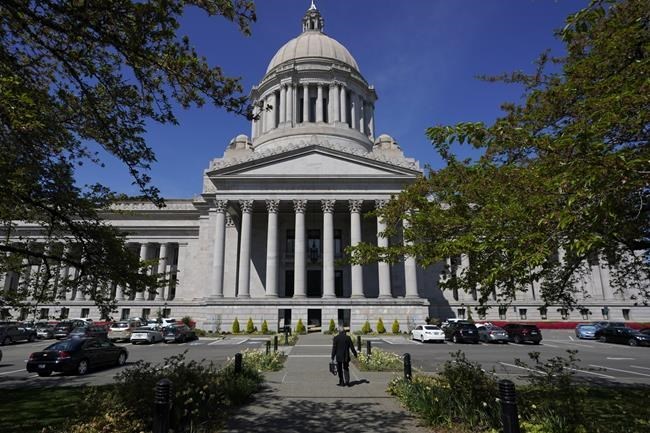SPOKANE, Wash. (AP) ŌĆö Washington state's bipartisan redistricting commission failed to meet its deadline for redrawing political maps, meaning the task will now be taken up by the state Supreme Court.
This is the first time the panel has failed to finish its work since the state adopted a constitutional amendment giving redistricting authority to a bipartisan commission after the 1990 census.
The panel had a deadline of 11:59 p.m. Monday to approve new boundaries for congressional and legislative districts following the 2020 census. They voted hastily just before midnight but failed to publicly produce any maps.
ŌĆ£Last night, after substantial work marked by mutual respect and dedication to the important task, the four voting commissioners on the state redistricting commission were unable to adopt a districting plan by the midnight deadline," the commission said in a statement Tuesday.
The commission members blamed the late release of census data combined with technical problems.
Officials for the redistricting commission did not immediately return telephone messages and emails from The Associated Press on Tuesday.
The state Supreme Court said it was prepared to take on the job.
ŌĆ£If it is confirmed that the commission missed the Nov. 15th deadline ... the Supreme Court shall adopt a plan by April 30, 2022,ŌĆØ the court said. ŌĆ£The court will await filings from the parties.ŌĆØ
The April 30 deadline would give candidates and incumbents less than three weeks to know the boundaries of their U.S. House and legislative districts before the May 20, 2022, deadline to file for office.
State Sen. Andy Billig, D-Spokane, the Senate majority leader, thanked the redistricting commissioners for their work.
ŌĆ£I am confident that the Supreme Court, elected by the people of this state, will draw a map that represents the values of this state and meet the well-established requirements in state and federal law,ŌĆØ Billig said. "Washingtonians expressed their desire for a map that keeps cities, counties, and communities of interest together, offers fair, unbiased, and equal representation to all, and importantly creates a majority Latino legislative district in Yakima as the federal Voting Rights Act requires.ŌĆØ
But the commission's work was quickly denounced by Redistricting Justice for Washington, which had been seeking a majority Hispanic legislative district in the agricultural Yakima Valley. That was likely a key point of contention on the commission, the group said.
ŌĆ£The Redistricting Commission not only failed to meet the statutory deadline, but it also declined to interact with the public during public meetings, limited accessibility in critical moments, and grossly disregarded transparency expectations," said Yakima City Council member Dulce Gutierrez in a statement from the group.
The Supreme Court "must draw districts, particularly in Yakima, that respect the sovereignty of the Yakama Nation and create majority-minority districts that enable communities of color to elect the candidates of their choice,ŌĆØ Gutierrez said.
Others were also critical.
ŌĆ£Leaving the districting task to the Supreme Court defeats the purpose of having a local Districting Commission to ensure that the process is more personal to the residents who live in these districts,ŌĆØ said NiRae Petty of the Urban League of Metropolitan Seattle, which was seeking more minority representation in the 9th Congressional District.
Under state law the Washington Supreme Court will take over the job of drawing new political district maps. The high court has until the end of April to come up with 10 U.S. House districts and 49 state legislative districts that will be in place for the next decade, starting with the 2022 midterm elections.
Washington didn't gain a new U.S. House seat following the latest census, but the delay in producing new maps means further uncertainty about what the new political maps will eventually look like.
Currently, Washington has seven Democratic U.S. House members and three Republicans. The state Legislature is controlled by Democrats.
Washington's Supreme Court justices are elected but the contests are officially non-partisan.
WashingtonŌĆÖs 2021 commission consisted of four voting members ŌĆö two Democrats and two Republicans ŌĆö appointed by legislative caucus leaders. The Democratic appointees were former legislator Brady Pi├▒ero Walkinshaw and state labor-council leader April Sims; Republican commissioners were former state legislators Joe Fain and Paul Graves.
By law, at least three of the four had to agree on new political maps by Nov. 15.
After going into a scheduled public meeting via Zoom at 7 p.m. Monday, the commissioners went into closed-door caucuses, which drew criticism.
ŌĆ£If a local government did anything like this the Legislature would spend months scolding every city and county across the state for months. This is a complete joke,ŌĆØ said Pierce County Council Chair Derek Young in a tweet.
The Washington Coalition for Open Government denounced the secretiveness of the commissionŌĆÖs process.
ŌĆ£ThatŌĆÖs not the way itŌĆÖs supposed to work,ŌĆØ said executive director Juli Bunting. ŌĆ£Our beef is the fact they shut the public out.ŌĆØ
Nicholas K. Geranios, The Associated Press


